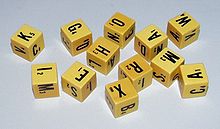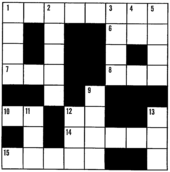Letter game
Letter games are games that are based on the attraction of word formation through letter arrangement or rearrangement. They were particularly popular in the 16th and 17th centuries. Some of them are designed in the manner of a crossword puzzle .
Letter games are mostly placement games . There are also many simple shapes that just require a pencil and paper.
Games
- Boggle
- Hangman
- Letra mix / letter cubes - Scrabble variant with cubes
- Don't say anything about Pulok
- City, Country, River and Think Fix games for several people, where speed counts.
- Scrabble - a board game
- Scrabble Cards / Letter Cards - Card version of Scrabble (the letters are printed on playing cards used to lay out the words). Similar to the letter dice, this has the advantage that you don't need a game board. Compared to the letter cubes, it has the advantage that more cards are available, so more and longer words can be formed.
- Shiritori - word chain game
- End-beginning - Two players take turns naming words, whereby the ending letter of the previous word must be the first letter of the next word. Usually one gives a subject area, e.g. B. nature, professions, or the like.
- Lingo / Word Mastermind - similar to the classic logic game Mastermind , a player selects a word (usually short, 4-6 letters long) that his opponent has to guess by saying words of the same length (often within a given time). The first player then marks letters that are also in the word to be guessed at this point (e.g. by an underscore or a square around the letter) as well as letters that also appear in the word to be guessed, but elsewhere there (e.g. by a wavy line under the letter or a circle around the letter). So the opponent tries to get closer to the word to be guessed with every further guessing attempt (which is often limited to a certain number).
- Word Forming - A longer word is given and the players then have to form new words using the given letters of that word. In contrast to anagrams, only part of the letters may be used, but no letters may be used that do not appear in the original word.
Often letter games are also offered as educational games for children to consolidate the reading process or for adults to support learning a foreign language as educational support.
mystery
- Crossword puzzle
- Syllable puzzles
- Search phrase - find words and phrases in a salad of letters ; In a grid of various letters, various (often given or circumscribed) words are hidden that can be found horizontally, vertically or diagonally (also against the usual reading direction, from right to left or from bottom to top).
- Rebus - picture puzzle
- Word leader
- Guessing anagrams and palindromes
literature
- Hanna Sörensen: Letter games (= my friend Conni. ). With pictures by Uli Velte. Carlsen, Hamburg 2005, ISBN 3-551-18436-4 .
- Frans Coninx, Petra Stumpf: Letter games. Sound exercises for elementary school. Vandenhoeck & Ruprecht, Göttingen 2008, ISBN 978-3-525-79012-0 .


